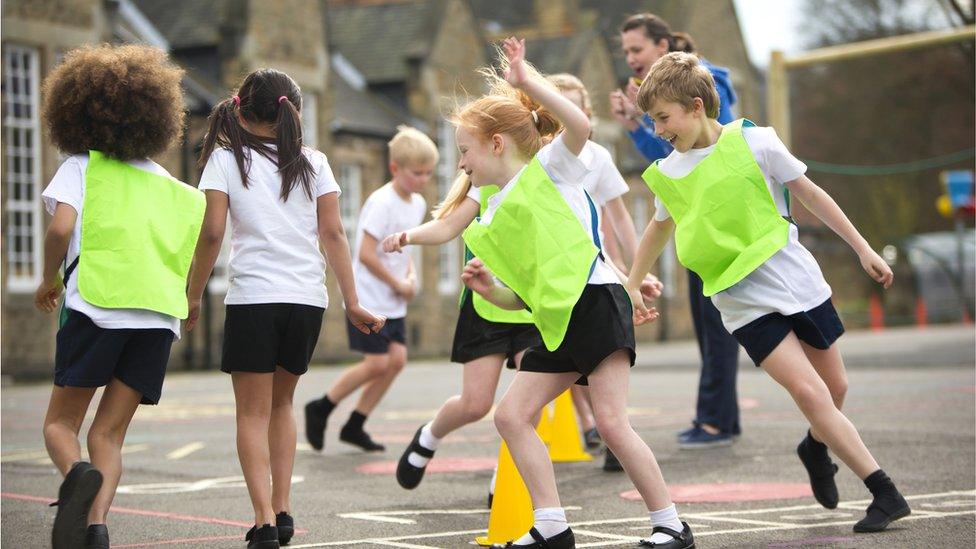Children 'should be weighed up to age 18', report says
- Published
- comments

Children and young people up to 18 should have their weight and body mass index (BMI) recorded every year, says a report by child health experts.
The Royal College of Paediatrics and Child Health, external says England is falling behind other countries on obesity, mental health and infant deaths.
It predicts rising health problems by 2030 without changes in policy.
An NHS England spokeswoman said the report provided "useful context" for its long-term funding plan.
The plan is set to be published this year.
Currently, children in England are measured at primary school, up to the ages of 10 and 11, but not after that.
The report, Child Health in 2030 in England, says more needs to be done to halt obesity.
It compared different aspects of children and young people's health in England with 14 other European Union countries plus Australia, Canada and Norway.
The report found England has poorer health outcomes than the average across those 18 countries and, based on recent trends, is likely to fall further behind them over the next decade.
The report highlighted:
high mortality for one to 19-year-olds in England and Wales for respiratory conditions like asthma and epilepsy
higher proportions of young mothers and smoking during pregnancy
low rates of breastfeeding compared to most EU countries
mental health problems set to increase by 2030
a third of boys living in the poorest areas of England will be obese by 2030
A&E attendances for children and young people are high and set to rise in the next 12 years

Poverty lies at the root of many major child health challenges, the report says, and a properly-funded health strategy focused on children and young people would help turn things around.
It says England has seen some successes - in how diabetes is controlled, in rapidly reducing smoking rates among young people and low numbers of death from injuries.
And it acknowledges that the government's childhood obesity plan is likely to "help to reverse current obesity trends".
The report makes a series of recommendations, including:
extending the current asthma register to include children from five to 18 years old
recording the weight, height and BMI of all children two to 18 years old on an electronic growth chart once a year
making the "red book", a child's health record, available online
publishing information on how much funding is allocated for children and young people's physical and mental health services and how it is spent
developing a children and young people's health strategy for England
investing more in school nursing and health visiting services
organising local child mental health systems so that they are delivered as close as possible to home

Prof Russell Viner, report author and president of the Royal College of Paediatrics and Child Health, said: "This report clearly identifies the danger on the horizon - but trends shown here are not inevitable.
"Each of them could be turned around if key actions are undertaken."
He said it was "hugely encouraging" that child and maternal health had been highlighted in the NHS England long-term plan, which is published soon.
He added the plan was "a crucial opportunity for improving child health".
"Act now or the consequences are grave," was Prof Viner's message to policy-makers.
'Top priority'
Alana Ryan, from the NSPCC, said it was unacceptable that so many children were unable to access help mental health support from local services when they needed it most.
"Young people's mental and emotional wellbeing must be a top priority in the new NHS England strategy."
The Royal College of Nursing said the report painted "a bleak picture for children and young people".
And it said health visitors and school nurses were "the front-line defence against childhood obesity and poor child mental health" but all too often they were understaffed.
A Department of Health and Social Care spokesperson said: "Improving children's mental and physical health is a key priority for this government and will be pivotal in our long term plan for the NHS, which we're backing with additional funding of an extra £20.5 billion a year by 2023/24."
- Published11 October 2018

- Published24 June 2018

- Published7 August 2018
